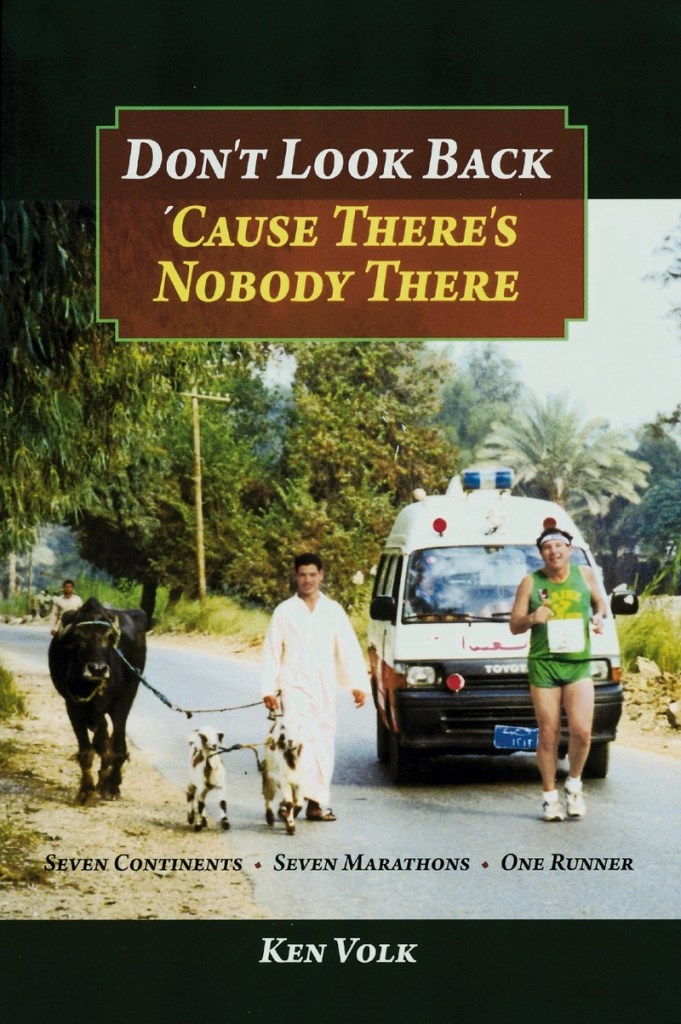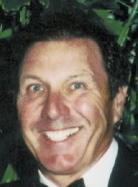Ken Volk ran his first marathon in Portland in 1979. He was 41 years old. During the next 16 years, he ran around the world.
Volk, co-founder of Volk Packaging Corp. of Biddeford, is part of an elite group who have completed marathons on each of the world’s continents. When he finished his Antarctica marathon in 1995, only three other runners were known to have achieved this feat; now, the group includes about 300 members.
Volk, who will turn 73 later this month, no longer runs. A devastating back injury has kept him from doing what he loves. But it hasn’t prevented him from telling his story. Volk recently self-published a memoir of his journey, “Don’t Look Back — ‘Cause There’s Nobody There.”
Volk is donating a portion of proceeds from sales of his book to the Maine Children’s Cancer Program, which he and his company have supported to the tune of $60,000 over the years.
Q: How did you get into running? And why not start small with a little 5K? Why jump into the marathoner’s league from the get-go?
A: Well, I did the 5Ks and the 7Ks, but I never got the enjoyment out of those races. I found that everybody was so concerned with the PRs — the personal records — it wasn’t fun to run.
I’m not a fast runner. For me to go out and try to break 8-minute miles or 7-minute miles, it’s not realistic.
I enjoyed the running for the running, not because I had to go beat a time. When I saw that Casco Bay Marathon in 1979, I was bitten.
Q: What type of commitment is required to complete the training necessary to run your first marathon? In the book, you talk about a strict no-martini diet. But I suspect there’s a lot more to it than that.
A: There is, yeah. I was really very weight conscious. I got down into the 170s. I watched everything I ate. If I ate a piece of meat, I felt it the next day.
But that wasn’t the main commitment. The main commitment was from the family. My life, and everybody else’s therefore, revolved around that run the next day.
If I knew that I had a long run on Saturday, my whole week was geared to that one run, that one day. I just prayed for no rain. The family put up with me. Your social life, your business life, your family life, your relations with your kids. I remember one instance walking into the Maine Mall I couldn’t take another step. I just fell asleep. They looked back at me, and I was fast asleep standing up. I was just so tired.
You think you can conquer the world, but you can’t. You think you feel like a million dollars, but total fatigue takes over.
Q: Tell me some of the places that marathoning has taken you on your seven-continent quest.
A: My wife loves to travel. She doesn’t do trips that are short. When we went to Japan to do Mount Fuji, we traveled around on our own for three weeks, on trains and buses. We didn’t speak the language, but people were very nice everywhere.
Japan was probably the most difficult, because of the language.
Australia was great. Australians love Americans, and we had a great time in Australia. Probably the most fascinating place was Cairo.
We combined that with Israel, and we traveled around Israel for three weeks. Unfortunately, it wasn’t a good trip for me. I had plantar fasciitis. I was on a cane, and walking in Israel is not easy. A lot of cobblestones. Israel is a pretty old place, so I really didn’t enjoy it. I just wanted to get this marathon over with, I was in so much pain.
But when I got to Cairo, I just sort of woke up. I found the city the most unbelievable city you would ever want to see. Here’s the Sphinx and here’s the pyramids and reading about them when I was a little kid in Hebrew school, it was mind-boggling that I could actually be there. I loved Cairo.
Paris is Paris. When you run Paris, it’s a happening. The people are throwing candy at you and have apples and oranges for you, and yelling “bravo” and bands playing. And the city is the most beautiful city. And, of course, Boston.
Q: Somewhere along the way, you teamed up with the Maine Children’s Cancer Program. How did that come about?
A: My wife was on the board, so I knew about the Maine Children’s Cancer Program and the wonderful things they do and continue to do to this day. It’s a wonderful organization, and they were always in need of money. It was a shoestring operation. Now it’s much bigger, with the support of Maine Medical Center.
I can’t tell you where this epiphany came from. I just don’t know. But I recall being in Paris and seeing the Eiffel Tower in front of me and saying, “‘I’ve got to do this.” Back then, a lot of people didn’t know about the organization. We solicited all the donations by hand. It was a lot of work, but it was fun doing it. I wrote a letter on my own stationery, and put a stamped envelope in with it and sent it to people. I used to look forward to coming into the office to see how many checks came back every day. It was a tremendous satisfaction. It was the most satisfying public thing I have ever done.
With this book, I put in a little piece of paper in the books that I have given out, asking for a donation. I figure if I am giving them a free book, they can make a donation. People have been forthcoming. I don’t know how much has been raised, but I think about $3,000 just from putting a piece of paper in the book. I am very gratified about that.
Q: What have you learned about yourself, and what lessons can others learn from your story?
A: A lot of times, things have been kicked at me, primarily in business. Business has its ups and downs, and your whole life really revolves around your business. Is your business making money? Are you having a good time?
When things were tough, I always knew that if I could get through the marathon, I could get through this. A lot of that I learned from these marathons. If you put one step in front of the next, you will get to the finish line. It taught me perseverance. And it gave me a lot of self-worth. When I finished this, there were only three other guys in the world who had done it. I thought I was going to be the only one at the time, but there were three others, and that’s OK. Now there are about 300. It’s a wonderful accomplishment.
Staff Writer Bob Keyes can be contacted at 791-6457 or at:
bkeyes@pressherald.com
Follow him on Twitter at:
twitter.com/pphbkeyes
Send questions/comments to the editors.




